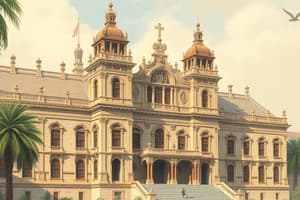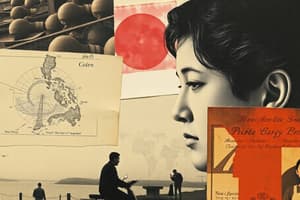Podcast
Questions and Answers
What is the primary focus of Araling Panlipunan in the Philippine education system?
What is the primary focus of Araling Panlipunan in the Philippine education system?
- Mathematics and science education
- Physical education and sports
- Social studies including history, geography, and culture (correct)
- Art and music appreciation
Which of the following is NOT one of the objectives of Araling Panlipunan?
Which of the following is NOT one of the objectives of Araling Panlipunan?
- Promote artistic talent and creativity (correct)
- Foster awareness of local and global issues
- Enhance critical thinking and analytical skills
- Encourage social responsibility
What is emphasized in the study of Geography within Araling Panlipunan?
What is emphasized in the study of Geography within Araling Panlipunan?
- Natural resources and environmental issues (correct)
- The importance of arts and literature
- Personal health and fitness
- The commercial benefits of tourism
Which teaching method is NOT commonly used in Araling Panlipunan?
Which teaching method is NOT commonly used in Araling Panlipunan?
How does Araling Panlipunan contribute to student assessment?
How does Araling Panlipunan contribute to student assessment?
What aspect of the Philippine economy is covered in the Araling Panlipunan curriculum?
What aspect of the Philippine economy is covered in the Araling Panlipunan curriculum?
Which of the following is a significant outcome of studying Araling Panlipunan?
Which of the following is a significant outcome of studying Araling Panlipunan?
Which cultural aspect is explored in the Araling Panlipunan curriculum?
Which cultural aspect is explored in the Araling Panlipunan curriculum?
Study Notes
Araling Panlipunan
-
Definition: Araling Panlipunan is a subject in the Philippine education system focused on social studies, covering history, geography, government, culture, and economics.
-
Objectives:
- Enhance understanding of Filipino culture and society.
- Develop critical thinking and analytical skills.
- Foster awareness of local and global issues.
- Promote values such as nationalism and social responsibility.
-
Key Components:
-
History:
- Study of Philippine history from pre-colonial times to contemporary events.
- Understanding significant historical figures, events, and movements.
-
Geography:
- Examination of the Philippines' physical and political geography.
- Exploration of natural resources, climate, and environmental issues.
-
Government:
- Overview of the Philippine political system and its foundations.
- Discussion of civic rights, responsibilities, and democratic processes.
-
Economics:
- Basic concepts of economics, including supply and demand, production, and consumption.
- Analysis of the Philippine economy, including agriculture, industry, and services.
-
Culture:
- Exploration of Filipino customs, traditions, and values.
- Study of diverse cultures within the Philippines and their contributions.
-
-
Teaching Methods:
- Use of interactive activities such as group discussions, role-playing, and projects.
- Integration of multimedia resources (videos, articles, and online tools).
- Field trips to historical sites and cultural institutions.
-
Assessment:
- Quizzes and tests to evaluate understanding.
- Project-based assessments focusing on real-world applications.
- Participation in class discussions and activities.
-
Current Issues:
- Discussions on contemporary social, political, and economic issues affecting the Philippines.
- Emphasis on global citizenship and environmental stewardship.
-
Significance:
- Aims to produce informed and responsible citizens.
- Encourages active participation in community and national affairs.
Conclusion
Araling Panlipunan plays a crucial role in shaping the understanding and values of Filipino students, equipping them with the knowledge necessary for civic engagement and cultural appreciation.
Definition
- Araling Panlipunan is a subject in the Philippine education system that emphasizes social studies.
- It encompasses history, geography, government, culture, and economics.
Objectives
- Enhance comprehension of Filipino culture and society.
- Develop critical thinking and analytical abilities among students.
- Increase awareness of local and global issues.
- Promote values such as nationalism and social responsibility.
Key Components
-
History:
- Covers Philippine history from pre-colonial era to modern events.
- Highlights significant historical figures, events, and movements.
-
Geography:
- Studies the physical and political geography of the Philippines.
- Analyzes natural resources, climate, and environmental concerns.
-
Government:
- Provides an overview of the Philippine political system and its foundational principles.
- Discusses civic rights, responsibilities, and democratic processes.
-
Economics:
- Introduces fundamental economic concepts like supply and demand, production, and consumption.
- Analyzes the structure of the Philippine economy, focusing on agriculture, industry, and services.
-
Culture:
- Examines Filipino customs, traditions, and core values.
- Explores the contributions of diverse cultures within the Philippines.
Teaching Methods
- Incorporates interactive activities, including group discussions, role-playing, and projects.
- Utilizes multimedia resources such as videos, articles, and online platforms.
- Includes field trips to historical sites and cultural institutions for experiential learning.
Assessment
- Utilizes quizzes and tests to measure understanding of the subject.
- Employs project-based assessments that focus on real-world applications.
- Encourages participation in class discussions and collaborative activities.
Current Issues
- Engages in discussions surrounding contemporary social, political, and economic challenges faced by the Philippines.
- Emphasizes global citizenship and environmental stewardship in addressing these issues.
Significance
- Aims to cultivate informed, responsible citizens who actively participate in community and national issues.
- Equips students with knowledge conducive to civic engagement and appreciation of culture.
Studying That Suits You
Use AI to generate personalized quizzes and flashcards to suit your learning preferences.
Description
This quiz focuses on Araling Panlipunan, a key subject in the Philippine education system that covers social studies, including history, geography, government, culture, and economics. You'll enhance your understanding of Filipino society and explore important local and global issues.




